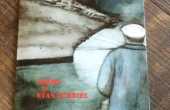pjoshualaskey
Contributing writer for The Artifice.
Junior Contributor II
- Lurker
- Sharp-Eyed Citizen
- ?
- Articles
1 - Featured
0 - Comments
4
- Ext. Comments
4 - Processed
3 - Revisions
3
- Topics
2 - Topics Taken
0 - Notes
3
- Topics Proc.
5 - Topics Rev.
0
- Points
144 - Rank
X - Score
77
Latest Articles
Latest Topics
Explore how fans' (of other genres) anticipation and/or rejection of film adaptations may be tied to human biologyIs there a connection between the human bias towards visual stimuli and the way people react positively to the prospect of having something they love (a book, a video game, a comic strip, a play, etc.) brought into the screen realms of either television or movies? Conversely (or complementarily), is there something similar in the way people react adversely to having something they love "done badly" onscreen? Does the visual override other sensory inputs? other memory centers (be they intellectual or emotional)?
|
If you are only literate in one language (like English), can you really ever say you've "read" authors who write in other languages?Many people say that they've "read" Tolstoy or Camus (or any host of other writers). But if the reader in question is a monolingual anglophone, how can they have "read" a Russian author? or a French-speaking one? When someone has "seen the movie" of something (like one of the Harry Potter series), they don't generally get credited with also having "read the book" even though the one is adapted from the other much as a translation is worked from the original. What's the difference? Why do popular ideas about translation allow for almost seamless "knowledge" of the "original work" while ideas about adaptation do not?
|
Latest Comments
| Translating Children Books: Difficulties and Reluctances | |
You said: “There are two things, however, that one cannot learn to become a writer, and that is, how to learn and how to persevere.” Why do you think someone can’t learn how to learn? Do you think it’s an innate ability and that educators (of all stripes) have no impact whatsoever on that ability? And if one can’t learn how to learn, does that mean one can’t learn how to learn better? Interested to know other people’s thoughts on this as well. | Can you Teach Someone how to Become a Writer? |
What do you think of investing in teaching anglophone children other languages earlier on so that they can bypass publishers (and other gatekeepers) in the search for language cultures outside their own? | Translating Children Books: Difficulties and Reluctances |
You write: “The translation of writing in the modern world, then, is not from one language to another—as we encounter this much more regularly now in our daily routines than ever before in history—but from one channel to another, changing the message as it needs to be fitted for its new platform.” I’m interested to know how you think “one language to another” is different from “one channel to another”. How are languages NOT channels? How ARE they channels? How does “translation” between any two points (being language, channels, or something else) square with your thoughts on the “Purpose/Advantage/Challenge” of “translation” itself as a medium? | The Modern Translation of Writing |

I grew up monolingual until taking Spanish in high school (as per a typical American education), so I had to work extra hard to gain access to Spanish (with the help of teachers for three years and then living in Spain). I’ve learned French by living in Paris. I wish all children in California (my home state) learned Spanish and English from their first moments in school. We’re a bilingual state. And then they could go from there! 🙂
À bientôt !